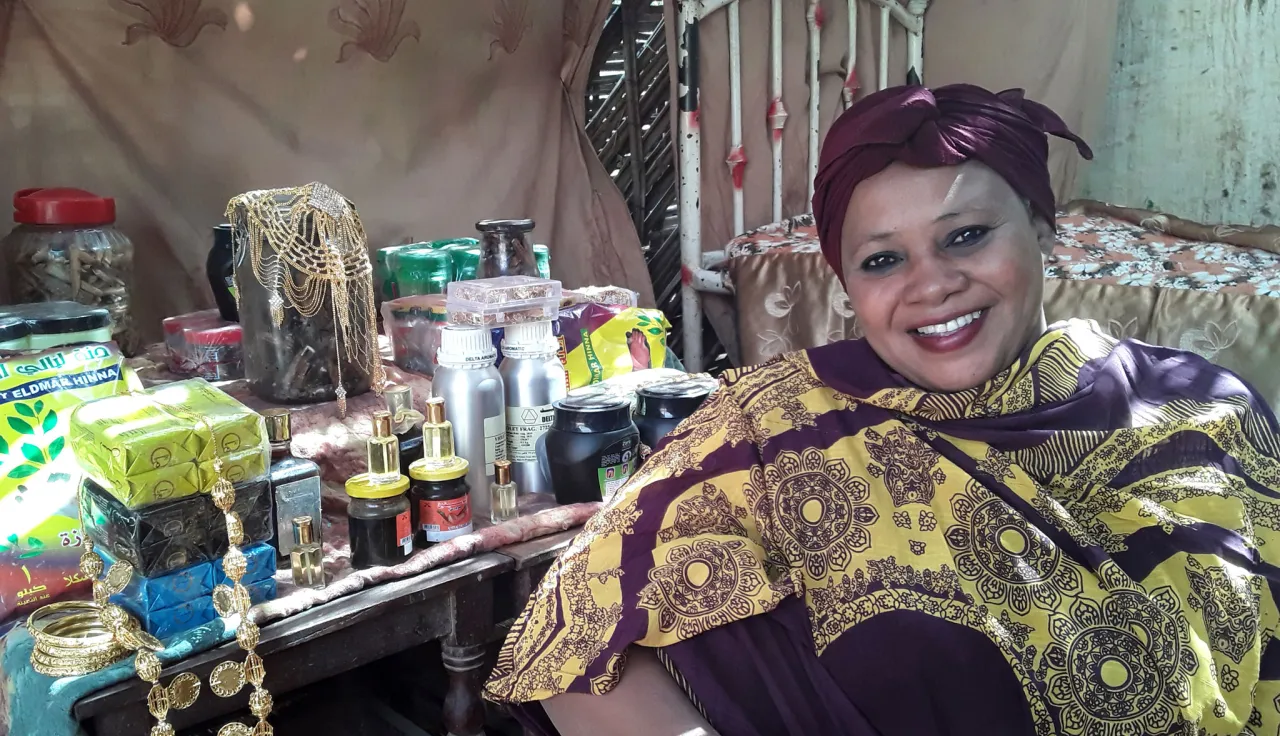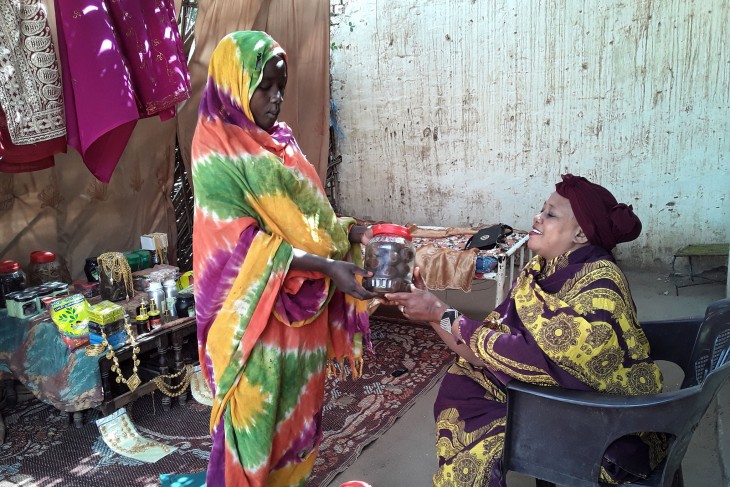Sudan: Staying at home and stopping work, not an option for everyone

In these uncertain and extremely worrying times, not everyone can practise social distancing, or afford not to work. Take, for example, Rahama Hassan Abdalla and Khadija Adam Omar. Both are participating in the ICRC’s Micro-Economic Initiative (MEI) for vulnerable persons living with a disability and are beneficiaries of the National Authority for Prosthesis and Orthotics (NAPO)’s Physical Rehabilitation Centre in Nyala, South Darfur, which is supported by the ICRC.
As a child, Rahama's mother taught her to make perfume from sandalwood and other natural ingredients. At the time, neither of them guessed how this knowledge would come in useful decades later.
My disability has never stopped me from doing what I want to do.
At the age of twelve Rahama contracted polio. It left her severely disabled and unable to stand. But far from blunting her dreams, she saw it as a challenge. "My disability has never stopped me from doing what I want to do," she comments. "It really hasn't hindered me at all."
In 2019, Rahama, now nearly 40 years old, and a beneficiary in NAPO's Rehabilitation Centre in Nayala, applied for the ICRC's MEI grant. Her innovative, unusual and well-planned proposal to sell perfume and wedding finery drew praise, and she was awarded 25,000 Sudanese pounds (500 US dollars).

Rahama showing some Dilka to a client in her beauty shop. Photo: Jessica Barry
The ICRC's MEI programme aims to help NAPO beneficiaries continue their re-integration into society following treatment and rehabilitation. The scheme began in Nyala in 2013. To date, 453 NAPO beneficiaries have received grants and now run successful small businesses thanks to their startup money. Grants are paid in two installments, one part at the beginning of the project, and the balance after the first month, when the business should already be up and running. Monitoring and support are provided by the ICRC.
With the money she received, Rahama turned the room where she lives in her brother's house into a boutique. On a low table next to the bed she placed bottles and jars of her homemade scent, together with necklaces, bracelets and other costume jewelry for a bride to wear on her wedding day. She also bought two wedding dresses, one red and one blue, and hires them out by the day for 300 Sudanese pounds (SDG) - about 5 US dollars.
I am not married, but I have lots of beauty tips to share with future brides.
One recent morning, Rahama opened her shop as usual and waited for clients. Soon, a young woman arrived and asked for some Dilka, a body scrub for the shower. They chatted for a while, then Rahama wrapped up the Dilka and the girl left. "I am not married, but I have lots of beauty tips to share with future brides," Rahama smiles. "Dilka, makes your skin smooth and gives you energy. We should use it before the wedding."
Not far away from Rahama's shop another MEI recipient, 24-year-old Khadija, was also starting her day. A victim of polio which has left her with a partially paralysed leg and arm, Khadija joined the MEI programme last year. Her proposal was, if anything, more ambitious than Rahama's. She wanted to make ice cream.

Khadija at home where she prepares her homemade ice creams. Photo: Jessica Barry
Given Sudan's searing summer heat, keeping ice cream frozen in a cramped, one-room hut in a displaced persons' settlement, where there is no running water and only intermittent electricity would challenge even the bravest heart. But for Khadija, challenges were nothing new. Her pastoralist parents migrated to Nyala when she was a child, after losing their livestock during the conflict in Darfur. Although her parents and five siblings have now returned to their former life, Khadija has stayed on in Nyala to provide for her family.
Khadija received the 25,000 SDG grant and bought a fridge with her startup money. It takes up almost half the space in her tiny room, alongside a bed, two chairs, a cool box and some shelves piled with clothes. To make her ices, she buys orange and 'karkadi' juice made from red hibiscus flowers, mixes both juices with sugar, pours them into small plastic sachets and puts them in the fridge to freeze.
With her colourful ices packed into the cool box, and wearing a leg brace for support, Khadija makes a daily tour of the local settlements selling her wares for two SDG to local children. During term time she also visits schools. When there are power cuts and the ices melt, she sells the juice.
I would like to go back, but I have to support my family.
Khadija's life is far from easy, and she admits she is homesick for her pastoralist past. "Water and firewood and milk were free," she sighs. "I would like to go back, but I have to support my family."
Today, with COVID-19 eating into every fibre of how the world turns, the vulnerable and poor globally are more than ever on the frontlines of risk. And whilst medics and aid agencies, government authorities and the UN deluge people with guidance about staying safe, keeping a distance, and staying at home, Rahama and Khadija, like millions of others living a hand-to-mouth existence have no option but to continue working. If Rahama closes her boutique, her meagre savings would disappear within days. Khadija does not even have savings. If she can't sell her ice-cream she wouldn't eat. Nor, in the wider reality of things, would her family.



